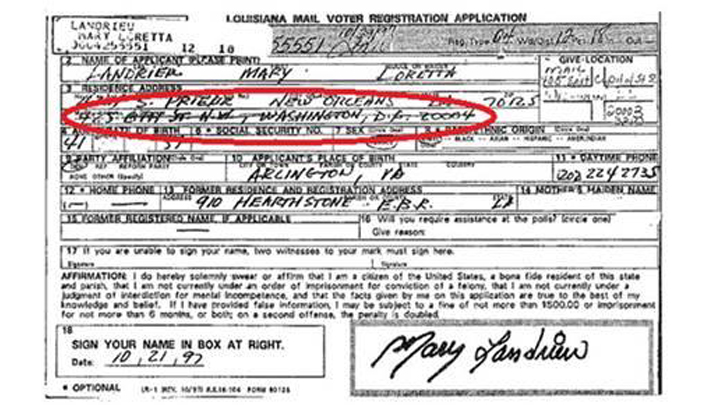By Louis Avallone
–
Senator Mary Landrieu is reimbursing taxpayers several thousands of dollars that she took and spent for a charter flight to attend campaign events, including a fundraiser in Dallas. She has an estimated net worth between $894,018 and $2.6 million, with assets totaling $1.9 million to $3.1 million, according to her own disclosure forms, yet she doesn’t maintain as much as an apartment in this great state of Louisiana.
She represents the Louisiana people in Congress, but no longer finds it necessary to live here herself – even her voter registration card lists her primary residence as Washington, D.C. Maybe it’s because, as she said in a recent interview, “I really can appreciate the life that we live on the Hill.”
And she’s done a lot living on the Hill, indeed, with the citizens of Washington, D.C. She sponsored a bill allocating $2 million for District of Columbia schools, which are ranked 26th in the nation, while schools in Louisiana still remain ranked near the bottom – 49th in the nation. She’s an advocate for the District of Columbia, as she said in a speech recently, and she wants “to speak on their behalf”. No doubt this is why the mayor of Washington, D.C. has proudly called Landrieu “the Senator representing the District of Columbia until we become the 51st state of the United States.”
Goodness gracious, Mary. What’s wrong with you? Or as our south Louisiana family might say, “Mary, why don you ak right?”
The truth is that these Mary shenanigans represent the last vestiges of Louisiana populist politics that asks the question first (and last), “What’s in for me?”
There’s lots of examples of this in our state’s history. Governor Huey P. Long, even while wildly protesting against the wealthy in the 1930s, and proposing to guarantee every family a basic annual income, was himself making plans to become that which he so publicly abhorred – being wealthy. As a result of Long’s allegedly questionable acquisition of mineral rights to state owned properties, concentrated in wetland areas along our coast, those mineral rights have generated nearly $1 billion in royalties for his family and associates – and continue to do so still today.
Then there was Governor Edwin Edwards. He was a populist, and was elected 4 times as governor because of it. In the end, though, he was found guilty of racketeering charges and sentenced to ten years in prison. In that case, Edwards had asked the question, “What’s in it for me?” and received $845,000 from a contractor who wanted to do business with the state, while at the same time raising taxes on the people of Louisiana by almost $1 billion.
Then there was populist U.S. Representative Bill Jefferson from New Orleans, who rose from poverty to then serve in Congress. He accepted $500,000 in bribes while in office, in exchange for his influence in Congress. He hid some of that money in his freezer, as you may recall, but was sentenced to 13 years in prison after everything had thawed out.
Then there was New Orleans Mayor Ray Nagin who recently was convicted on 20 of 21 counts of bribery, and is now serving 10 years in prison. Prosecutors explained that Nagin sold the mayor’s office, for personal gain, which included lavish trips and cash, even after Katrina, where he had ignored federal and state offers of help, and their recommendations to evacuate the city before the storm.
All of these examples share a common denominator: These politicians all claimed to be champions of the people, and defender of the “little guy”. Instead, the people lived under one set of rules, while their elected leaders lived by another. They said one thing, and then did another.
They may have had good intentions, but one only needs to look around to see what decades of politicians’ good intentions have done to our nation, and our communities. Intentions are powerful beginnings. They provide a spark to ignite a purpose, launch a plan, and to direct the mind, but they tell you nothing about the actual outcome.
Huey Long made famous the slogan, “Every man a king, but no one wears a crown.” Sounds good, but history has shown it’s often the politicians who end up wearing the crowns. All politicians, to some degree, sound alike – and it’s becoming harder and harder to tell the difference.
But at least they ought to live in the state that they are representing, so we can keep an eye on them, and figure it out for ourselves.
Robert Frost wrote famously in a poem about how two roads diverged in the woods, and how he chose the one less traveled, and how “that has made all the difference”. For our state’s elected officials in Washington, shouldn’t they choose the road back home, as well?
